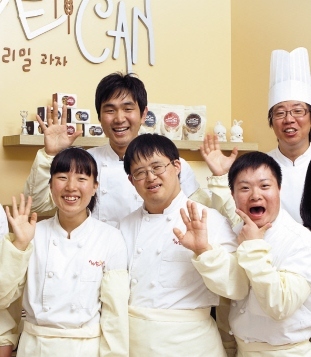
Workers at We Can pose at their cookie shop in Gyeonggi Province. (We Can)
Aiming to provide jobs for the socially vulnerable and build a sustainable welfare system, social enterprises have been sprouting up in Korea in recent years.
Around 720 such companies are running, a 20-fold increase from 36 in 2007 when the government started supporting their operations under the Social Enterprise Promotion Act. They currently hire around 17,410 people and made 521 billion won ($48 million) in revenue in 2011.
The government is considering diversifying its support from next year by giving more specialized consultations to full-fledged social enterprises and general management advice for start-ups. The financial support for the social enterprises will be funneled into those that promote the business environment such as business development and group purchase rather than direct financial support such as for labor cost, according to the Ministry of Employment and Labor.
The first state-designated social enterprise is Dasomi Foundation, which employs single mothers for free day-care services to poor and elderly people.
The state-run Korea Social Enterprise Promotion is in charge of certification of social businesses. Its criteria include reinvesting at least two-thirds of profits in social causes and recruiting more than 30 percent from vulnerable groups such as low-income citizens, the elderly, the disabled or victims of prostitution.
The following are leading social enterprises in Korea.
Goodwill Store
Seoul City founded the Goodwill Store in Songpa district, southern Seoul, in 2011, which provides jobs and training to those with disabilities to help them become independent.
The disabled people working at the store sell donated products ranging from baby clothes to cosmetics and kitchenware while consumers can benefit from buying the products at cheap prices.
The city spent around 18 billion won ($1.7 million) for the construction, and supports around 500 million won a year for management.
The second branch of the store is scheduled to open early next year in Dobong district, northeastern Seoul, according to the organization.
The Goodwill Store adopted the management system of Goodwill Industries International, Inc., a U.S. nonprofit organization for the disabled and the poor. The Goodwill Store, like its U.S. counterpart, runs based on four standards; management by an experienced manager, expanding supporting firms to stabilize the supply of products, constant improvement in retail structure and building an information system for retail management.
The proceeds are used for job-training programs for disabled and underprivileged people.
We Can
We Can, established in 2001, hires the disabled to make cookies. Currently 39 disabled people are employed, making 12 types of cookies.
The cookies are made only with domestic ingredients and use no chemical additives, coloring or preservatives.
It had maintained the same prices for three years before raising them last year due to the increase in ingredient prices. Two cookies are sold for around 4,000 won. We Can’s revenue jumped from 70 million won in 2001 to 1.3 billion won 2011.
Maximizing profit is not the main drive for the firm. Half of the profit goes to the workers and the other half is used to purchase materials, according to Lim Joo-hyeon, a manager at the firm.
Sharing Happiness
Sharing Happiness was founded in 1999 by the Food for the Hungry International Federation, an international relief and development organization, which is working in 82 countries for development projects and emergency relief.
Sharing Happiness that became an independent entity in 2008, runs secondhand shops in Korea and fair trade cafes, and holds charity bazaars.
The cafe in Seoul only uses fair-trade coffee from Mexico and Indonesia.
Some of the profit from the cafe is used for education for children in Cambodia.
The organization receives donations from private companies and sells them at its 33 secondhand shops across the nation to help children in need around the world.
The organization also helps the elderly by building welfare facilities.
By Kim young-won (
wone0102@heraldcorp.com)

![[Exclusive] Korean military set to ban iPhones over 'security' concerns](http://res.heraldm.com/phpwas/restmb_idxmake.php?idx=645&simg=/content/image/2024/04/23/20240423050599_0.jpg&u=20240423183955)

![[Graphic News] 77% of young Koreans still financially dependent](http://res.heraldm.com/phpwas/restmb_idxmake.php?idx=645&simg=/content/image/2024/04/22/20240422050762_0.gif&u=)


